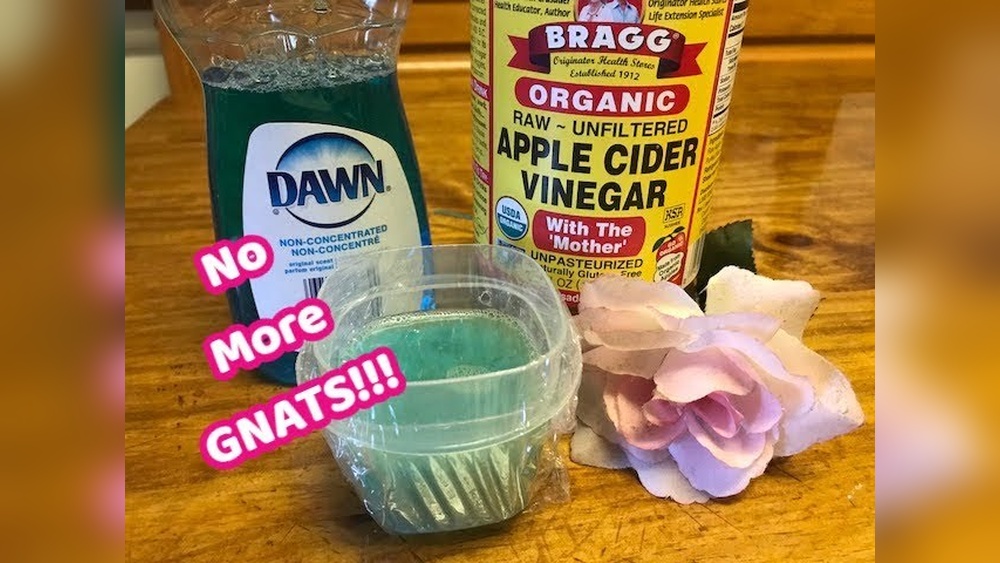Are tiny gnats buzzing around your kitchen and driving you crazy? You’re not alone.
These pesky little insects can quickly turn your cooking space into an annoying battleground. But don’t worry—getting rid of gnats doesn’t have to be complicated or messy. In this guide, you’ll discover simple, effective ways to banish gnats from your kitchen for good.
By understanding what attracts them and learning easy tricks to repel or trap them, you can enjoy a fresh, gnat-free kitchen again. Keep reading, and take back control of your space today!

Sources Of Gnats In The Kitchen
Organic matter in drains is a common source of gnats. Food particles and grease build-up create a perfect place for gnats to lay eggs. Regular cleaning of drains helps stop their growth.
Overripe fruits and vegetables attract gnats easily. They love the sweet smell and start breeding near these items. Keep fruit bowls checked and remove any spoiled produce quickly.
Houseplants and soil can harbor gnats too. Damp soil is a favorite spot for them to live and multiply. Avoid overwatering plants and let soil dry out between waterings.
Moisture and standing water in the kitchen create ideal breeding grounds. Leaky pipes, wet sponges, or puddles invite gnats. Dry these areas regularly to keep gnats away.
Natural Repellents For Gnats
Essential oils such as peppermint, eucalyptus, and citronella repel gnats effectively. Peppermint oil mixed with water and a bit of soap makes a good spray. Spritz it near windows, doors, or on plant soil. Eucalyptus oil works well in sprays or candles to keep gnats away. Citronella is popular in candles and torches, especially outdoors.
Planting or using lavender and rosemary also helps. Lavender plants or candles create a scent gnats dislike. Fresh rosemary sprigs placed near plants or closets can reduce their presence.
| Essential Oil | Use |
|---|---|
| Peppermint | Spray around windows, doors, and plant soil |
| Eucalyptus | Use in sprays or candles |
| Citronella | Burn in candles or torches outside |
| Lavender | Plant or use scented candles indoors |
| Rosemary | Place sprigs near plants or closets |
Herbs like basil, mint, and thyme are great for indoor planting. They create smells gnats avoid. Keep these herbs in small pots near kitchen windows or counters.
Household scents such as vanilla and vinegar can also help. Vanilla lotion or spray on skin keeps gnats away. Vinegar traps attract and catch gnats when placed in small bowls around the kitchen.
Homemade Gnat Traps
Apple cider vinegar trap is simple and effective. Pour a small amount of apple cider vinegar into a bowl. Add a few drops of dish soap to break the surface tension. Cover the bowl with plastic wrap and poke small holes on top. Gnats are attracted to the vinegar smell and get trapped inside.
The wine or beer trap works similarly. Use leftover wine or beer in a container. Cover and poke holes for gnats to enter. They cannot escape once inside. This trap uses the sweet smell of fermented drinks to lure gnats.
The fruit trap method uses ripe or rotting fruit placed in a jar. Cover the jar with plastic wrap and poke holes. Gnats fly in for the fruit but cannot leave. This method is natural and uses what you already have at home.
:max_bytes(150000):strip_icc()/how-to-get-rid-of-gnats-in-your-home-5207918_final-41fa648920424fe9a9177585aef3d3fc.png)
Cleaning And Prevention Tips
Regularly cleaning drains stops gnats from laying eggs. Use a brush and hot water to scrub drains weekly. Baking soda and vinegar can help clear buildup and kill larvae.
Store food in sealed containers or the fridge. Keep fruits and veggies dry and check for rotting pieces. Clean crumbs and spills quickly to avoid attracting gnats.
Manage plant soil moisture by watering only when dry. Overwatering creates a damp place where gnats breed. Let soil dry between watering to keep gnats away.
Eliminate standing water from sinks, pet bowls, and plant trays. Gnats need water to live and lay eggs. Check these spots often and empty any water found.
Chemical And Commercial Solutions
Insecticides designed for kitchens kill gnats safely. Choose those labeled as non-toxic or food-safe. Use sprays in corners, sinks, and garbage areas only. Avoid direct contact with food or surfaces where food is prepared.
Sticky traps catch gnats effectively. Place these near fruit bowls or trash cans. They do not use chemicals, making them safe around food. Screens on windows and vents stop gnats from entering the kitchen.
Fans create strong airflow that gnats dislike. Set a small fan near your sink or trash bin. This keeps the air moving, making it hard for gnats to fly. It’s a simple way to reduce their presence without sprays or traps.

When To Call A Professional
Signs of Severe Infestation include seeing many gnats flying around your kitchen. You might also find gnats resting on walls or near food. Another sign is a strong, unpleasant smell from decaying matter. If gnats breed in drains or garbage, the problem is serious. They can spread bacteria and cause health risks. Severe infestations are hard to control with home methods.
Choosing Pest Control Services means finding a trusted professional. Look for companies with good reviews and licenses. They use safe, effective treatments to remove gnats quickly. Professionals can find hidden breeding spots you might miss. They often offer a warranty or follow-up visits. Costs vary, so ask for a detailed estimate first. Hiring experts saves time and reduces stress.
Frequently Asked Questions
What Smell Do Gnats Hate?
Gnats hate strong smells like peppermint, eucalyptus, citronella, lavender, vanilla, vinegar, garlic, and cinnamon. These scents repel them effectively.
What Causes Gnats In The Kitchen Sink?
Gnats in the kitchen sink appear due to food residue, organic matter buildup, and stagnant water in drains. These attract gnats for breeding.
What Is The Best Diy Gnat Killer?
The best DIY gnat killer uses apple cider vinegar traps combined with peppermint or eucalyptus essential oil sprays. Sprinkle cinnamon on soil to disrupt larvae.
Why Are Gnats So Bad In The Kitchen?
Gnats thrive in kitchens due to food residue, moisture, and organic waste. They spread bacteria and contaminate food, making them a health risk.
Conclusion
Getting rid of gnats in the kitchen takes patience and simple steps. Keep your kitchen clean and dry to stop their breeding. Use natural sprays made from essential oils like peppermint or vinegar. Set traps with apple cider vinegar to catch adult gnats quickly.
Regularly check plants and food for signs of infestation. Small efforts every day make a big difference. Say goodbye to gnats and enjoy a fresh, pest-free kitchen. Stay consistent, and the problem will fade away soon.

Yes, working as , Food Blogger and Product Reviewer for last 6 years. Here you will get amazing deals for Smart kitchen products. I am your best source for the latest update in cooking trends. I provide insightful articles, reviews, and analysis on cutting-edge kitchen gadget. My mission is to empower readers with the knowledge they need to stay ahead in a rapidly evolving coking world. Join me as we explore the future of food technology and how it shapes our lives today and tomorrow.




